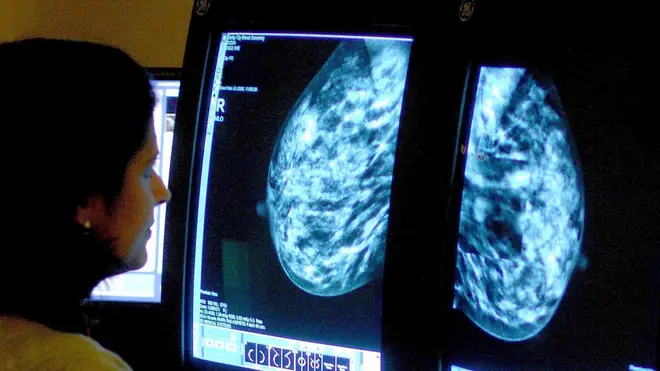
Iain Dale 10am - 1pm
9 March 2021, 23:04

Nearly 11,000 women could be living with undiagnosed breast cancer
Nearly 11,000 people in the UK could be living with undiagnosed breast cancer after the Covid-19 pandemic paused screenings, a charity has warned.
Breast Cancer Now calculated that 10,700 fewer people were diagnosed with breast cancer between March and December 2020 than it would have expected.
The team analysed a range of data to reach the figure, including the number of people starting their first treatment for breast cancer, the number of women screened each month and the length of time for which services were paused.
Even though services have resumed, the charity said they are operating at around 60% capacity due to the need for social distancing and infection control.
It warned of a forthcoming "perfect storm", with health workers in imaging and diagnostic services under unprecedented pressure due to the pandemic, having already been "chronically under-resourced" beforehand.
Baroness Delyth Morgan, chief executive of Breast Cancer Now, said: "The tragic cost of almost 11,000 missing breast cancer diagnoses is that in the worst cases, women could die from the disease.

"And looking ahead, while we cannot know the full impacts of the pandemic, what we do know now is that over the coming years the number of women coming forward could overwhelm our already over-stretched workforce.
"Women with breast cancer have already paid an unacceptable price due to the pandemic - we simply cannot afford for any more time to pass before UK governments invest in and tackle the crisis facing the cancer workforce.
"Only then will we be giving women the best chance of an early breast cancer diagnosis which we know is critical to their chances of survival."
During the pandemic, breast screening services were paused for different amounts of time across the UK, including around four months in Scotland and five months in Wales.
While services were not officially paused in England, Breast Cancer Now said this still happened as hospitals turned their attention to fighting Covid.

Camilla Tominey reacts to Harry and Meghan's interview
Overall, it said nearly 1.2 million fewer women in the UK underwent breast screening between March and December.
Meanwhile, there was a 90,000 drop in referrals to a specialist for patients with possible symptoms of breast cancer in England between March and December.
Overall, it put the number of patients undiagnosed with breast cancer due to the pandemic at around 8,900 cases in England, 890 in Scotland, 687 in Wales and 248 in Northern Ireland.
Jane Murphy, clinical nurse specialist at Breast Cancer Now, said some women had been reluctant to visit their GP or hospitals for fear of catching Covid-19, or did not want to burden the NHS.
"The pandemic has thrown us all into unprecedented times and it's natural people will have concerns," she said.
"But the sooner breast cancer is diagnosed the better the chances of treatment being successful, which makes it vital that women continue to check their breasts regularly and get any new or unusual changes checked with the GP, and continue to attend breast screening appointments when invited.
"The NHS wants people to attend their appointments and report symptoms to their GP - they have measures in place to keep staff and patients safe."
Dr Jeanette Dickson, president of the Royal College of Radiologists, said: "It is vital that those patients who missed screening last year - or who did not see their GP if they had possible symptoms - come forward.
"The NHS is open for business and the sooner we can diagnose cancer, the sooner we can treat it.
"Screening teams are getting back up to speed, but breast imaging services were in a precarious position going into the coronavirus pandemic and those resourcing challenges are still there.
"Many breast units have vacancies and there is a looming shortage of breast radiologists due to retirements.
"The backlog of cases waiting will put even more pressure on stretched diagnostic teams and the cancer teams then responsible for tailoring and delivering treatment.
"The diagnostic and treatment workforce caring for breast cancer patients desperately needs more investment to ensure our future patients get the speedy care they deserve."